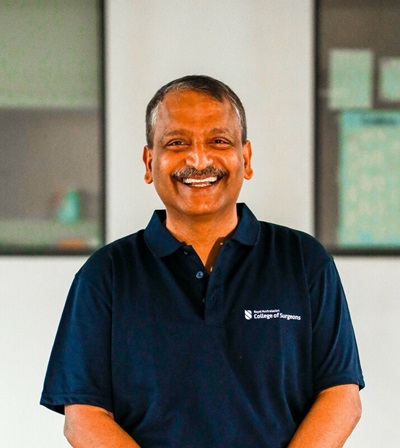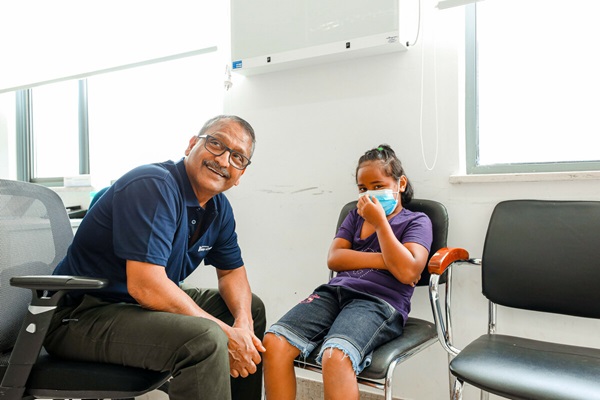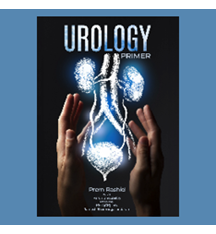2023 | Volume 24 | Issue 3

Participating in the week-long volunteer program earlier this year, Dr Kukkady says, “It was immensely rewarding, and I hope to continue such endeavours in the future.”
Dr Kukkady's passion for paediatric surgery has taken him on an extraordinary journey, crossing continents and encountering unforeseen challenges along the way.
At 17, he began his medical journey, when he witnessed his first operation—a hernia surgery on a newborn—during his second year. This experience, combined with guidance from an exceptional mentor during clinical postings, ignited his passion for paediatric surgery.
By the age of 27, Dr Kukkady had completed his training, earning his MBBS and MS degrees from Kasturba Medical College of Mangalore in India. Seeking further advancement, he pursued the prestigious Magister Chirurgiae (MCh) qualification in paediatric surgery from Calicut, now known as Kozhikode.
It was during this time that Dr Kukkady 's professors, who had themselves been trained in Australia, facilitated his opportunity to work as registrar in Sydney. He arrived in 1992 with the plan to return to India after two years.
However, Dr Kukkady's plans took a different turn with the Babri Masjid demolition in 1993 that saw Hindu-Muslim riots even in his hometown. Being a Muslim himself, his father urged him not to return. “That made a huge change in my life,” Dr Kukkady says.
In his final days in Australia, Dr Kukkady applied for residency in Aotearoa New Zealand, which was just opening its doors to immigrants.
But before the process was complete, he obtained a position in England as a clinical Fellow in paediatric surgery at Oxford Radcliffe Hospital. He completed his Fellowship of the Royal College of Surgeons of Edinburgh (FRCS) and just as his stay in the UK came to an end, Dr Kukkady received approval for residency in Aotearoa New Zealand.

Arriving in Aotearoa New Zealand with his two young children in 1997, Dr Kukkady’s journey to establish himself as a paediatric surgeon had its share of challenges. Despite his past experience including completing an International Fellowship in Los Angeles, he couldn’t find a job.
“So, I did the New Zealand Registration Examination Clinical exam, typically taken by final-year MBBS students, in order to be considered for employment,” Dr Kukkady says.
He secured a registrar’s position at Starship Hospital by chance. A previous international Fellow hired for the role was unable to communicate effectively in English, leaving the hospital in need of a replacement.
While working as a registrar, Dr Kukkady once again applied for training in paediatric surgery. This time he was accepted.
During the four-year training period, he also passed the Fellowship of the Royal Australasian College of Surgeons (FRACS) exam, further solidifying his expertise.
In 2003, Dr Kukkady was selected as a consultant in Waikato Hospital, Hamilton, launching his career as a paediatric surgery specialist.
A year later in 2004, Dr Kukkady experienced a defining moment in his career—the opportunity to perform a complex operation to separate the first set of Pygopagus conjoined twins in Australasia.
“This unique and complex procedure had never been attempted in Australia or New Zealand, resulting in limited references and data,” recalls Dr Kukkady.
Despite these obstacles, Dr Kukkady conducted extensive research and sought advice from experts worldwide. The absence of visual documentation added further difficulty in comprehending the operation's intricacies.
He formed a skilled interdisciplinary team, built a strong relationship with the twins' family, and kept the operation a secret as per the family’s wish.
“The twins were born prematurely but were stable. The separation required a staged approach. The first stage involved gradual preparation of their skin over two months using tissue expanders,” Dr Kukkady says.
The final separation was the culmination of a multidisciplinary team effort that took 22 hours to complete.
“This stands as the highlight of my career,” Dr Kukkady says, who recently discharged the twins from his care.
While the response following the conjoined twins' separation was incredible, Dr Kukkady says he felt immense pride, considering that some had advised him to pursue alternative specialties when he first arrived in New Zealand casting doubt on his ability to thrive in paediatric surgery.
Today, Dr Kukkady primarily practices in the public sector and holds various positions in the field of paediatric surgery. Notably, he serves as the New Zealand representative to the Board of Paediatric Surgery for FRACS.
Having been part of Global Health team in Samoa as a volunteer, he is passionate about continuing his volunteering efforts. He believes in the importance of training local healthcare professionals rather than solely providing temporary assistance.
He remains in close contact with the doctors in Samoa providing advice and support in managing children with surgical problems there.
Outside his career, Dr Kukkady enjoys outdoor activities with his wife and has a passion for music and cricket.

